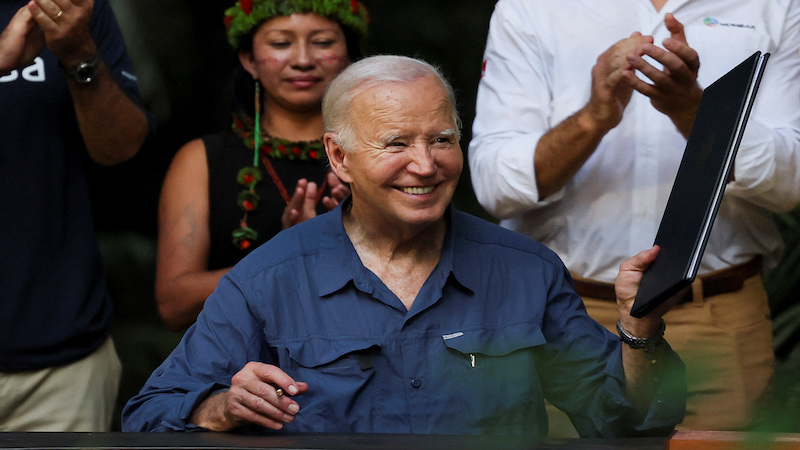Comment: The US government must support a landmark OECD agreement to end international oil and gas export finance
Elizabeth Bast is the executive director of the advocacy group Oil Change International.
As world leaders gather in Baku to negotiate global climate finance, a last-chance opportunity for the Biden administration to cement a global win on climate is emerging.
This week, OECD governments are in Paris negotiating an agreement that could put an end to $41 billion in annual oil and gas export finance – and crucially, this deal would be immune to political reversals, even under the future Trump administration.
This would be an essential stepping stone towards helping unblock wider discussions on the trillions in grant-based climate finance rich countries owe to the Global South.
The proposed OECD agreement would be particularly powerful because of its binding nature. It could only be undone if all negotiating countries agreed to reverse course – making it effectively “Trump-proof”.
Make-or-break moment
For Biden, as outgoing President, this represents a final opportunity to fulfill his 2021 executive order promising to end international fossil fuel finance. The majority of OECD countries, including the EU, UK, Canada, Norway, New Zealand, and Australia, have already been championing a proposal to end oil and gas export finance and are ready to reach an agreement.
Biden’s actions this week will make-or-break this progress.
High-level EU officials have already reached out to the Administration asking that they make the final call to agree so that this proposal can cross the finish line. However, the power of the Biden administration is now critically needed to get key laggards, including South Korea and Turkey, over the line.
We’ve seen the power of US multilateral leadership on export finance work before. In 2015, the Obama administration successfully championed a policy at the OECD to end coal-fired power financing – a commitment the first Trump administration couldn’t undo.
Now, Biden has the chance to replicate this success with oil and gas, creating another permanent safeguard for climate progress.
Push to get public money out of fossil fuels
This potential agreement builds on an encouraging shift in international energy finance.
The Clean Energy Transition Partnership (CETP), launched at COP26 in Glasgow, has already demonstrated remarkable success. Its 41 signatories, including major fossil fuel financiers like Canada, Germany, and Norway, committed to ending their international public finance for fossil fuels. And most signatories have followed through, helping reduce international fossil fuel finance by up to two-thirds – approximately $15 billion annually.
Though these sums might seem small, this shift has an outsized impact. Government financial institutions shape energy markets by signaling government priorities.
Public-backed finance, often provided at below-market rates, decreases financial risks for private sector investors and makes projects much more likely to go forward. Indeed, 82% of the LNG buildout in the last decade had public backing from G20 government’s export credit agencies (ECAs).
Indonesian company Pertamina operates an oil refinery that received support from the US export credit agency last year. Photo: Paulus Daniel
The timing is critical: this is the Biden administration’s last chance to keep its international commitments to end international public finance for fossil fuels.
The International Energy Agency’s Net Zero roadmap shows that global electricity systems must be nearly fossil-fuel-free by 2040 to maintain a 50% chance of limiting warming to 1.5°C. No new investments in upstream gas projects or LNG infrastructure can be justified under this scenario.
Step towards an ambitious COP29 deal
This OECD agreement would also help solidify other wins for the COP29 talks in Baku, where countries must commit to delivering substantial climate finance, including support for a just transition away from fossil fuels.
Rich countries owe trillions in grant-based finance to the Global South for climate action. Developed countries claim that they do not have the money and that large sums of private finance leveraged through small amounts of public finance must cover mitigation finance needs, including for an energy transition.
But this makes Global South countrie
Read More


